What's New
Displaying results 3551 - 3560 of 4914

Resource | Presentations,
Presentation on Counterfeit confusion: Is Intellectual Property enforcement the solution for dealing with fake or substandard drugs? at Regional Consultation and Planning Workshop “Use of TRIPS Flexibilities to Access Affordable ARVs in Asia” Bangkok 29-31 May 2012

Resource | Presentations,
Presentation on Criteria for patentability: a public health perspective at Regional Consultation and Planning Workshop “Use of TRIPS Flexibilities to Access Affordable ARVs in Asia” Bangkok 29-31 May 2012
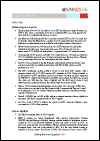
Resource | Reviews and Snapshots,
UNAIDS country brief on the HIV epidemiology and response, progress highlights and challenges in Fiji.
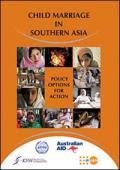
Resource | Publications,
Child marriage is not only a violation of a girl’s rights; it also seriously compromises efforts to reduce gender-based violence, advance education, overcome poverty and improve health indicators for girls and women. In these just released policy and advocacy briefs, the International Center for Research on Women (ICRW) and its partners highlight the life-threatening situations girls in nine Southern Asian countries face on account of child marriage and recommend ways in which policymakers can prevent the practice.
The nine countries included in the briefs are: Afghanistan, Bangladesh, Bhutan, India, Iran, Maldives, Nepal, Pakistan and Sri Lanka.

Resource | Reviews and Snapshots,
The MSM Country Snapshots is a new publication series that disseminates strategic information on HIV and men who have sex with men (MSM) in Asia and the Pacific. The four- to five-page documents are intended to circulate good practices, share progress, stimulate discussion, and inform priority interventions and advocacy efforts.
The Snapshots were initiated in recognition of the difficulty of accessing up-to-date country-level information on MSM and HIV. Most importantly, they allow for convenient access to key findings for anyone without paid subscription to academic journals or knowledge of sources for biological and behavioral surveillance data. The documents synthesize key findings at time of publication that span four areas of information: epidemiological, behavioural, programmatic, and legal.
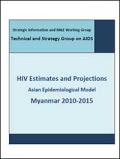
Resource | Publications,
In 2010, Myanmar engaged in the regional project on modes of transmission of HIV. This project aimed at improving the understanding of the HIV epidemics by estimating the incidence of selected subpopulations. Initially, the work was carried out by an ad‐hoc group comprising of staff from the Ministry of Health and United Nations agencies. Following the formation of the Strategic Information and M&E (SI/M&E) Working Group of the TSG, the responsibility for this work was given to the Working Group.
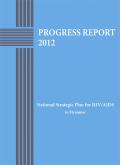
Resource | Publications,
The second Myanmar National Strategic Plan on HIV and AIDS, 2011–2015(NSP II),wasdeveloped in 2010. Progress onthe implementation of theplan is reportedon a yearly basis. The information included in this report has been provided by organizations involved in the national response to HIV and AIDS in 2012.
The NSP II includes threestrategic priorities and a series of cross-cutting interventions aimed at providing HIV prevention, care and treatment and support for people living with HIV (PLHIV) and creating an enabling environment to achieve the “Three Zeros”–zero new HIV infections, zero AIDS-related deaths and zero stigma and discrimination.
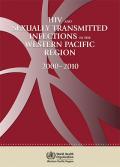
Resource | Publications,
It has been 12 years since the last report on HIV and sexually transmitted infection (STI) was published by the Regional Office for the Western Pacific (WPRO) of the World Health Organization in 1999. This report documents the achievements and challenges of the Region’s health sector response to the epidemic over the past decade. It identifies key technical recommendations to further reduce the number of new infections, and prolong and improve the quality of life of people living with HIV in the Region.
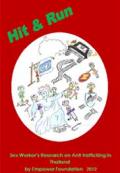
Resource | Publications,
Empower is a Thai sex worker organization started by Ms. Chantawipa Apisuk, a group of sex workers and activists in Patpong, Bangkok’s in 1984. In 2010 Empower decided to undertake a nation-wide community research project to identify and document the impact of the current Thai anti-trafficking law, policy and practice, on sex workers in Thailand, and to develop relevant and achievable solutions. There were 206 Thai and migrant sex workers had become part of the RATS-W project; leading the research consultations, interviewing, giving expert testimony, investigating and undertaking the analysis and preliminary documentation. The 206 sex workers who worked on the project can be divided into 170 research partners; 36 research leaders coordinated by a research working team of four. They are all referred to herein as research leaders, research partners or sex workers interchangeably.
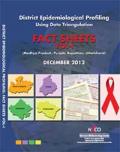
Resource | Fact Sheets,
The National AIDS Control Programme (NACP), since its third phase (2007-12) has a strong focus on district level planning, implementation and monitoring of interventions for prevention and control of HIV. The Programme is generating a rich evidence base on HIV/AIDS through a robust and expanded HIV Sentinel Surveillance system, monthly reporting from over 15,000 programme units, mapping and size estimations, behavioural surveys as well as several studies, research projects and evaluations.
This technical document is an outcome of the data triangulation process and consists of a snapshot on the district background, and on the HIV epidemic profile of each district based on the updated information on HIV Sentinel Surveillance, monthly programme data and key vulnerability factors. As the first volume of “District Epidemiological Profile”, this document gives an overview of the HIV epidemic scenario in each of the 104 districts from the states of Madhya Pradesh, Punjab, Uttarakhand and Rajasthan.





